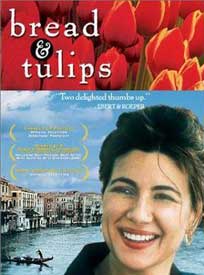Having seen the preview for the Italian serio-comedy Bread & Tulips, it looked a mite too jaunty & tra-la-la for my liking. Frankly I can forgive a trashy exploitation film for mediocrity a whole lot faster than I can forgive a love story for being anything short of great.
But the preview was misleading. This turned out to be a great film, which I might not have discovered if the leading man had been someone other than Bruno Ganz. The preview was totally off-putting, but I wanted to see Ganz anyway, he's been a favorite of mine since I first saw him in American Friend at the Seattle International Film Festival in 1977.
Licia Maglietta plays Rosalba, an emotionally starved if not actually abused housewife & mother of two teenagers whose family seems never to recognize her as anything but a clumsy servant to their needs. She is otherwise of so little consequence to them that they accidentally leave her behind during a bus tour. When they eventually realize she is missing, they call her on the cell phone to blame her for once again being such an enept nuisance.
So rather than find a way to reconnect with her touring family, she begins to hitchhike the opposite direction, ending up in Venice, starting a whole new life for herself.
This long-unappreciated woman possesses a great heart, & soon discovers she really is capable of reaching into the lives of people who can easily love her for herself. She arrives in Venice with next to no money, but a generous & trusting waiter (Ganz) lets her stay on his couch, eventually in his spare room.
She never finds out that had she arrived even minutes later, he would've been dead of suicide. Her presence gives him a reason to continue.
A ditzy "new age" masseuse in the same building becomes her closest girlfriend, & she soon finds work assisting an anarchist florist who is like a wonderfully loony grampa. With these people, plus the waiter's grandson & the grandson's mom (abandoned by the waiter's son), Rosalba discovers she has a much more loving family now than she ever had previously.
She sends post cards home assuring everyone she is okay & merely taking her personal vacation, but she does not let them know where she is. Her husband cannot convince either his mistress or his mother to clean house for him, so hires an amateur detective (being too cheap to hire a real one) to go to Venice & track her down. This chubby young man's only expertise for the job is his fondness for detective novels. The arc of his sub-plot develops into something as heartwarming as the main thread of the tale.
There are some very whimsical & visually beautiful sequences, & odd touches of magic realism as Rosalba's dream-life & real life coincide. Rosalba playing the pink accordian is alone worth the whole film (actress Maglietta really playing the instrument too).
It's a comedy but of no slapstick kind; it's very human & dramatic & endearing. Nor is it lightweight, because underneath everything is the fact that this woman who has found a life for herself has abandoned a husband & two sons.
Even allowing that her husband is a philandering asshole no woman should be stuck with; even allowing that one of her children is eighteen & ready to be off to college -- her abandonment of her family still leaves a sixteen year-old who with no parental guidance other than an unconcerned father is fast headed down the road of drugs & a drop-out.
At some point motherhood & her own inate decency forces Rosalba to return home if only for the sake of her younger son. This leaves the formerly depressed waiter once again in a deep gloom, & the sequences showing him sitting lonesome before the last bouquet of tuips Rosalba arranged in their kitchen, day by day saving the falling petals in a bowl, is truly the epitome of cinema's ability to be comical & tragic in a single stroke.
A nearly faultless film is somewhat spoiled by a hasty ending that strives to find an archly happy climax for everyone, something it could never achieve believably given the specific circumstances. But apart from the abrupt & rather clumsy pretense of a wonderfully happy ending, the bulk of this film is simply top-grade.
Although "heartwarming" often means wussy & dull, in this case it means a darned good film beautifully written & well acted with a winning array of eccentrics forging an alternative family for themselves -- which, if not actually possible, will nevertheless induce many of us to wish it could have happen for us just as it happens for Rosalba in Bread & Tulips.
copyright © by Paghat the Ratgirl
|
